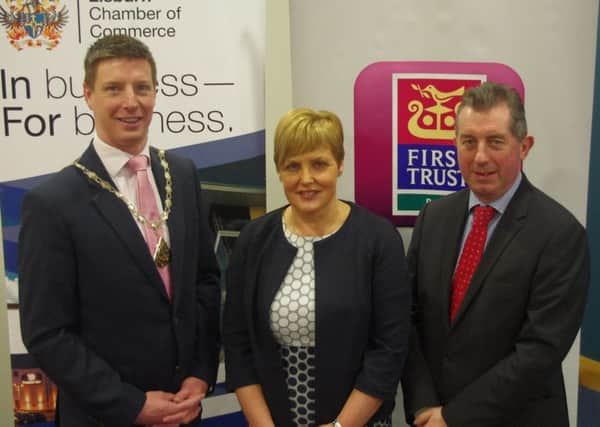Move to leave EU represents '˜clear and present danger to economy'


The impending Brexit negotiations and the potential implications of changes to existing trade structures were among the topics of discussion at a special business networking breakfast hosted by First Trust Bank in Lisburn on March 10.
More than 40 local business representatives gathered at Cafe Vic-Ryn to hear from Oliver Mangan, Chief Economist at AIB, who provided an economic overview and insight which made it clear that “a hard Brexit” is likely. He said if that’s the case, it will represent “a clear and present danger for both the Northern Ireland and Republic of Ireland economies”.
Advertisement
Hide AdAdvertisement
Hide AdMr Oliver suggested that Northern Ireland risks being more isolated from Europe and increasingly dependent on the UK export market, which itself could be damaged in the short to medium term by Brexit as new trading arrangements will take some time to put in place.


Reflecting on Mr Oliver’s presentation, a spokesman for Lisburn Chamber of Commerce said: “He identified key sectors such as agri-food, manufacturing, tourism and energy as being particularly vulnerable to the implications of a hard Brexit. While he noted the short term benefits in cross-border trade due to the weakened sterling and the potential for some RoI businesses to consider moving north to secure access to UK markets, he believed that NI would on balance be negatively impacted by a hard Brexit. He pointed to the loss of access to EU structural funds and other EU funding, the likelihood of Northern Ireland being less attractive for foreign direct investment and the potential damage caused by any disruption and increased costs to trade as the main factors.”
Speaking after the business breakfast, Judith Gill from First Trust Bank, which has hosted a series of regional business events across Northern Ireland, said: “While the economic forecast is for Northern Ireland to avoid recession in 2017 as consumers continue to provide support for economic growth, the key issue for both businesses and policy makers remains whether our strengths are sufficient to navigate the unchartered waters brought about by Brexit. We have particular reasons to be worried here in Northern Ireland and indeed on the island of Ireland. Against this backdrop of uncertainty, it is important that we bring as much clarity to the concerns of businesses as possible, so we can try and mitigate against the risks and help identify any opportunities that may be presented.
“We found the debate today very helpful and we will use the discussions and feedback to reinforce our planning and our ability to best support our customers as we navigate the months and years ahead.”
Advertisement
Hide AdAdvertisement
Hide AdJonathan Steen, president of Lisburn Chamber of Commerce, added: “Today’s excellent event provided the insight into Brexit many have been asking for and the implications lying ahead for local businesses in Lisburn and surrounding areas.”
The next Lisburn Chamber event will be a study visit to ConveyorTek on April 5.